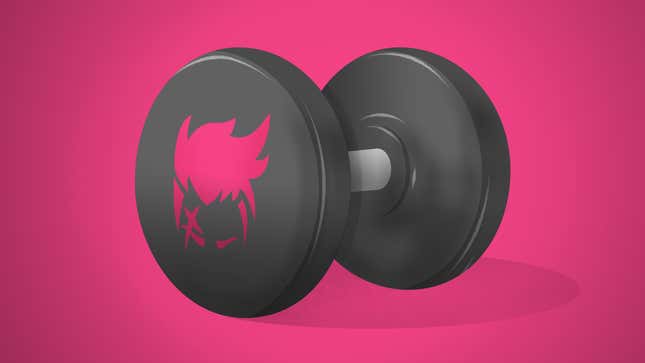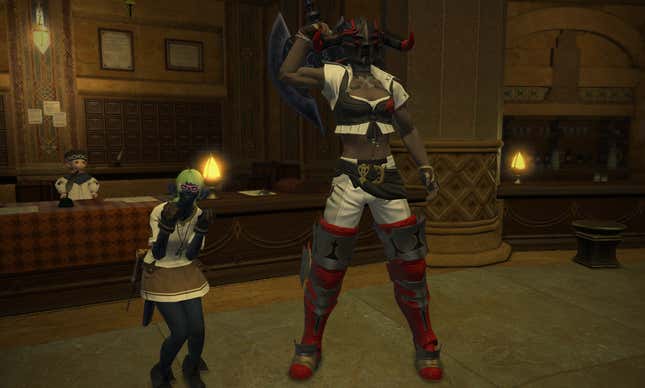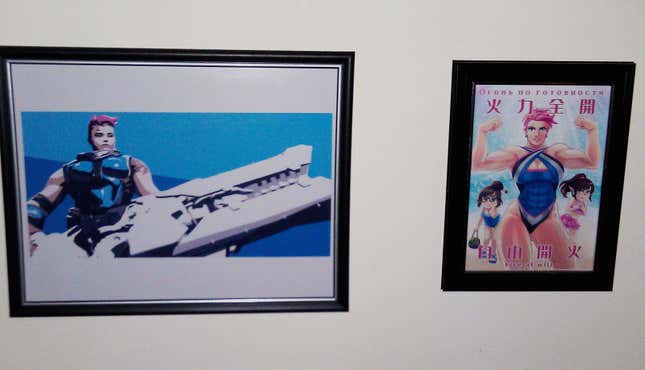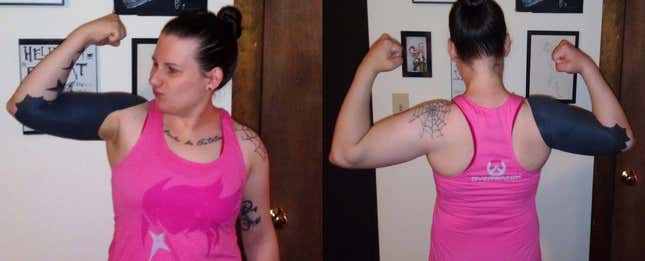
Overwatch features characters with body types and backgrounds that are not often seen in pop culture, let alone first person shooters. For many of us who rarely see ourselves reflected in media, this cast can seem radical and even life-changing—especially in my case. Zarya, Overwatch’s Russian strong-woman tank, inspired me to start weightlifting.
This piece originally appeared 7/27/17.
I’ve played video games since I was five, when my siblings and I got a SNES for Christmas. I came of age with a lot of first gen FPS games. I played DOOM and graduated into Goldeneye, Counter Strike and the Half-Life trilogy (yet to be concluded). As I got older, FPS games fell out of my rotation. I moved on to RPGs after Morrowind and eventually got into MMOs where I could make my own character and role-play. I wanted less ultra-fast twitchy action and more of a holistic gaming experience where I could find more emotional fulfillment than piloting a rugged action dude with a mysterious backstory could offer. I still like action games, but for years I mostly got my fix from platformers, twin-stick shooters, and the occasional single-player FPS game like Devil Daggers.
In role-playing games, I tend toward a “type” of character. I didn’t realize it for years, until my partner pointed it out while we were playing Final Fantasy XIV. In real life I am a whopping 5’4” woman with anxiety problems. In video games, I tend to play huge Amazon women. I regularly max out height and musculature settings, though the options are often disappointing. FFXIV is a refreshing exception. Here is my toon, a Roegadyn:

Playing as musclebound women in games is one thing, but actually being a big buff woman wasn’t something I ever entertained in real life. Every time a character editor forced me into a petite-framed bombshell, it reinforced ideas about femininity and how women’s bodies should look. Physically strong women are difficult to make in games given the limitations of most character creators, and this made them all the more impossible to imagine in real life. And like many women, my understanding of “exercise” was limited to cardio like biking or running. The idea that I could actually become strong was absurd to the point that it never struck me as a real possibility. When it crossed my mind it was such an alien thought that it seemed like a wild fantasy.
That was all before I played Overwatch. I wasn’t initially sold on the game—it had been years since I played a competitive FPS—but when I saw Zarya I decided to pick it up. Here was a game with a big, buff lady built right in! In Overwatch, Zarya is a champion Olympic weightlifter and the strongest woman in the world. Even though she could be seen as somewhat stereotypical, she was exactly the hero I needed, both in-game and IRL.
Once I had the game installed, I played as Zarya almost exclusively.

Anyone can hop on Overwatch and play as Zarya; her presence just feels normal. Her backstory is built into the game’s lore and stories, further cementing her as part of Overwatch’s world. The fact that she just existed in the game felt more important than any character I ever created. She wasn’t an attempt to push character editors to their limits; she was a main character in a AAA game. This was something I’d never experienced before, and it inspired me. I saw years of body policing and conditioned beauty standards for what they were, both in games and in real life. The fact this female character in a game could be celebrated for being strong so easily made me realize that I could be strong, and I resolved to try.
A few days into my first Overwatch binge I bought some dumbbells and started exercising. I had no idea what to do with the weights, but some quick googling led me to an introductory dumbbell-only workout program. I started doing squats and other exercises in my living room using the instructions from my dumbbell program and how-to YouTube videos featuring shirtless fitness bros. There seemed to be endless bodybuilding dudes on YouTube providing instructional videos on how to lift weights, but virtually no women. I cringed when YouTube bros said things like “and this movement will give you great aesthetics and the ladies will love it,” but I was learning what I needed to learn. So I’d simply shake my head and look at the framed picture of Zarya on my wall (yes, there is a framed picture of Zarya on my wall). I had been pretty much sedentary for several years, and those early dumbbell workouts were gruelling. Despite how exhausting they were and how sore I’d be days after each workout, I committed to sticking with them.

Zarya is an Olympic weightlifter, and Overwatch happened to come out in an Olympic year. I soon found myself watching the women’s weightlifting events at the Rio Olympics, where I found a bunch more real-life heroes. Before the 2016 Olympics, I had no idea what Olympic weightlifting was. The strength, speed, and precision of the athletes performing the two competition lifts, the snatch and clean and jerk, blew me away. I decided that this was the kind of lifting I someday wanted to do.
In order to learn Olympic lifting, I’d have to learn to use a barbell. I’d never been in a weight room, but by September I grew confident enough with my dumbbells to book a few sessions with a personal trainer (his name is Paul and he is charming). The first time I put a barbell on my back to squat I was so nervous that I felt a little sick to my stomach. I squatted the bar as Paul instructed, my trunk wobbling and my knees knocking. Paul was unbreakably positive as he explained in detail how to brace my core, lead with my butt, and force my knees apart to stay stable. By the end of the first session I was able to squat 65 pounds. My quads and butt burned, I was sweating so hard it looked like I just climbed out of a pool, and my upper back was sore from the metal where the bar had sat. Barbell squats were a whole new way of engaging with my body, and I felt it in muscles I didn’t even know I had (especially the next day). But I felt strong as shit! It might have been the post-exercise endorphins, but I felt like I was glowing after that first training session. I was instantly hooked on weight training; I wanted to feel the rush of a difficult workout again. The feeling of strength and power from pushing my body to its limits was liberating and empowering, and although new, it felt natural and familiar.

Over the next six weeks, Paul taught me most of the basic barbell movements, like squats, deadlifts, bench presses, and overhead presses. Learning these was exciting. Every workout pushed my body in new and different ways as I discovered different muscles and how to use them. I also started a nutrition plan, which constituted eating a ton of protein and dramatically cutting back on carbs. Paul designed the program to support my lifting, and my total newbie drive in the gym extended to my meals. I found it easy to jump into eating well. I by and large stopped drinking, and I went from eating pizza three times a week to eating lots of chicken, fish, and vegetables. Eating well and lifting weights regularly had me feeling amazing, sleeping well, and motivated me to wake up early for the first time pretty much ever. I rapidly started seeing progress and kept on ratcheting up the weight until I felt strong and confident enough to commit to learning the two Olympic lifts.
The snatch and clean and jerk are unique in the world of strength training. They’re referred to as “ballistic movements” because they require not only strength, but explosive power, speed, and finesse to lift the bar from the floor to above your head extremely quickly. They also require a great deal of shoulder and hip flexibility, core strength, and technique. It’s not enough to be able to move the weight; in these lifts you need the control to catch it properly in the bottom of a squat (called “receiving” the bar), then stand up with the weight. In going after this kind of training, I was committing to a significantly more advanced athletic endeavor than I had ever undertaken.
I was nervous but far more confident going in than I had been for my first-ever session with Paul. Still, working through the multipart explosive movements step-by-step in slow motion with a PVC pipe was a unique challenge in bodily awareness. The first time I snatched an actual weight (it was 43lbs) was the most satisfying thing I’d ever experienced. I stood up with the bar above my head with a big doofy smile on my face and felt like I’d just won the Olympics. It was like the payoff in a five round Overwatch match when you nail the wombo-combo in overtime to capture the point and win, only the buildup was eight months.
I am proud to say that I was successful in my dream to be a weightlifter: in April I earned a silver medal at a first-timer’s weightlifting meet. I lifted 102kg total (225lbs), with a 42kg (93lbs) snatch and a 60kg (132lbs) clean and jerk (in the sport of weightlifting, all weights are measured in kilograms). There is nothing quite like stepping up to a heavy barbell in a silent room and heaving it up over your head in front of a crowd of people and judges.
I had to reach into my heart and conquer my insecurities with singular focus. In training, I found that if I thought too much (or not enough) about what I was doing, I would miss the lift and have to drop the barbell, unable to complete the full movement. This is the precision needed in weightlifting; losing concentration, overthinking, or simply screwing up a technical position can keep you from lifting the barbell successfully. In one training session just two weeks before my first competition my coach gave me a few tips to improve my clean and jerk. I got so wrapped up in the cues she had given me that I failed four attempts in a row at a weight I had lifted moments before. I thought so hard about so many parts of the movement at once that I psyched myself out, and I ultimately had to take a 10 minute break, a luxury I’d not have had at a weightlifting meet.
In this way, I have found Olympic weightlifting meditative and humbling. It is as psychological as it is physical, and as technical as it is psychological. It requires deep focus and concentration, but also a clear mind and a burst of huge physical power. During my weightlifting sessions I find myself in a deeply mindful state, and I walk out of the gym physically exhausted but mentally revitalized.

I would not have discovered my passion for weightlifting without Zarya’s presence in Overwatch. In some ways, it feels silly that a character in a video game helped me break out of my fears and insecurities and commit to getting strong, but that is exactly what happened. In the last year, my life has completely transformed, and my body is a physical testament to how a game I love impacted me. These days I have a coach, I train three times a week, and my current goal is to qualify for the 2018 USA Weightlifting American Open. So far, my personal records are 60kg (132lbs) in the snatch and 70 (154lbs) in the clean and jerk. I can even deadlift double my bodyweight (287lbs). I am more proud of my body than I have ever been in my life.
It’s been a year since I started playing Overwatch and a year since I started lifting dumbbells—a year of resolve, sweat, and graviton surges. In that time, I’ve become an athlete working toward a national contest. I still play Overwatch on the regular, too. Zarya is my main, of course, but I can and do flex across most of the cast. I even feel like my lifting has helped my Overwatch game—I feel sharper on the battlefield and get tilted less than I used to, especially after a workout. I am happier and healthier than I have ever been. More than anything, I am grateful that Blizzard built a game with a brawny weightlifting heroine. She helped me find the strength of will to build the strength of mind and body I never knew I had.
Kelly is a giant (though diminutive) nerd who enjoys superheroes too much for her own good, playing video games, and has forgotten more about Star Wars than most people ever knew. She is a beautiful animal. She is a destroyer of worlds.

